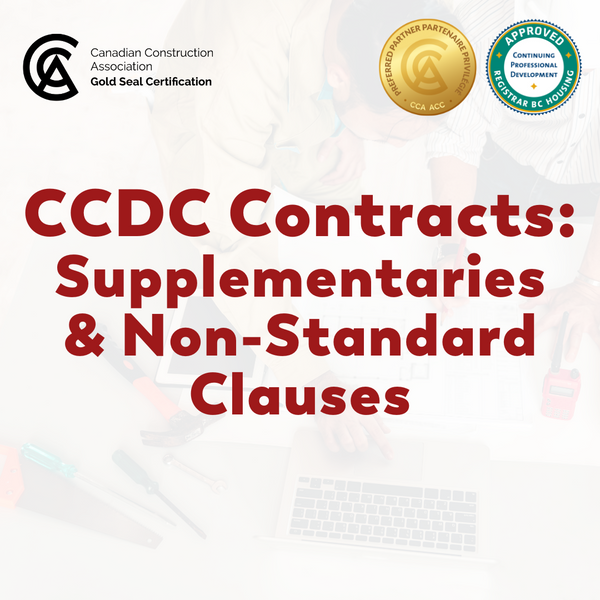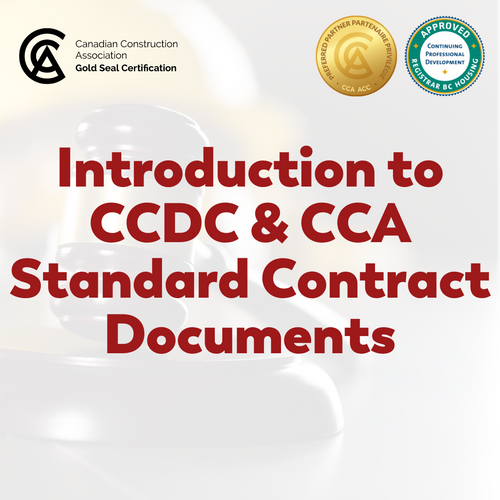Product Overview
What has caused these changes to industry standard contract clauses? Allocation of risk often gets modified in contract clauses based on Project Owner’s or their lawyer’s past experiences. The issue with modifications to contract clauses is the lack of understanding of what the clause means and its associated risks to Project Owners, Consultants, Contractors and other Stakeholders.
If the risk materializes:
- disputes arise,
- relationships are damaged,
- project costs can increase,
- schedules can be compromised,
- bidders can jeopardize their businesses and
- the potential for litigation increases.
It starts with reading and understanding the General Requirements, General Conditions and associated Supplementary Conditions in the contract. By exploring some Supplementary Conditions, you will hear from the perspectives of the Project Owner, Consultant and Contractor on why each clause exists and best practice recommendations on how to address the clause. But why does understanding supplementaries matter? Because without awareness, you cannot mitigate or manage the impacts of the clauses!
Learning Outcomes:
By the end of this course you'll learn:
- Understand the difference between General Conditions and General Requirements Division 01
- Learn WHY Supplementary Conditions and non-standard clauses are being used with CCDC contracts
- Realize some of the myths associated with their use
- Discover WHAT these Supplementary Conditions mean and WHY they are modified
- Learn that everyone interprets the Supplementary Conditions from a different lens and what that looks like from each other’s perspective
- Gain some recommended Best Practices
- Develop strategies on HOW to address the impact of these supplementaries
- Apply what you have learned to determine COSTS associated with these supplementaries
This course takes a practical, hands-on approach to learning. Your instructors will lead you through interactive exercises to examine several non-standard contract clauses, giving you an opportunity to apply what is discussed in class.
This course will review supplementary conditions modified from CCDC 2, 5A, 5B, 14, 15, CCA 1 and provincial standard contracts.
Orientation Session
A short orientation session (30 min) with your course instructor will be held via Zoom before the course (usually scheduled in the week before). During the orientation, your instructor will go over course information and familiarize you with the Zoom tools you’ll be using.
Who Should Attend:
Understanding the keys to success for construction management is important for all industry partners! This course is most applicable to mid-management personnel who will actively be working on Construction Management projects and administering the contract.
- General Contractors and Subcontractors:
- Construction Company Owners/Managers
- Project Managers
- Commercial Managers
- Estimators
- Business Development Managers
- Project Owners – Public and Private
- Third party Project Managers (for the Project Owner)
- Architects and Engineers
- Bonding and Insurance specialists
Industry Credits
- This course is worth 4 gold seal credits.
- This course is worth 12 Informal Continuing Professional Development (CPD) credits as approved by BC Housing.
Course Instructors
- Debbie Hicks, BSc| DSH Consulting - Course Facilitator
- Dean C. Slater, P. Eng., GSC
- Mark Scharf, BA, MHA
- Bill Chomik, AAA, SAA, OAA, AIBC, FRAIC, RCA | Kasian, Senior Principal, Vice President - Institutional
Course Format
- Live, Online, Instructor-led training. This is a highly interactive course facilitated by the instructor on a video platform.
- You will be expected to have your webcam on during the whole class and participate in break-out rooms, small-group discussions, and other activities with your instructor and classmates during the course.
- Course access information will be provided to you in advance of the training by your instructor
- Full attendance and participation in all sessions is mandatory for course completion. If a student misses a class session, we are unable to transfer registration or provide a partial refund of the registration fees.
Course Requirements (Technology & Participation)
This course requires full face-to-face interaction and participation from both the instructor and students. In order to attend, you’ll must make sure you have the following:
- This workshop will involve 100% on-screen interaction with the instructor and classmates, reading/viewing on-screen content like slides or videos, and interacting via typing with questions or responses.
- Computer/Laptop mandatory: Attendees are not permitted to attend via a tablet or cell phone
- Webcams are mandatory and are expected to be turned on during all course
- Every person able to see, hear, and observe the virtual course sessions must be a paid participant. Non-compliance of this requirement will result in removal from the course. Refunds will not be issued to students who are removed from the course for non-compliance.
- Virtual backgrounds are not permitted
- Group attendance via one paid registration is not permitted
- Students are expected to be fully engaged in the class
- Clear your work schedule just as you would for attendance in an in-class program
- Please make sure you secure a quiet space with minimal distractions
Refunds or Transfers:
- Five (5) or more business days before the course start date: Full refund of registration fees or can be transfers to a different course date.
- Less than five (5) business days before the course start date and course no-shows: No refunds or transfers to future course dates.
- For a complete document on the NRCA Education Policies, click here.
Other Policies
- Substitution of another member of your company/team is permitted up to the course start date for no additional fee.
- Unless otherwise stated, every person able to see, hear, and observe the virtual course sessions must be a paid participant. Non-compliance of this requirement will result in removal from the course. Refunds will not be issued to students who are removed from the course for non-compliance of this requirement.
- If the NRCA has to postpone or cancel courses due to insufficient enrolment, NRCA will refund the registration fee or, if possible, the attendee may choose to move to an identical session in the future.







